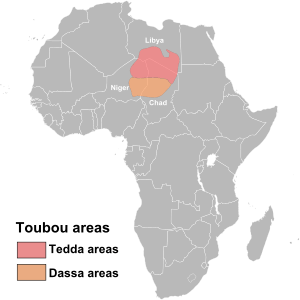Daza language
Daza (also known as Dazaga) is a Nilo-Saharan language spoken by the Daza people inhabiting northern Chad. The Daza are also known as the Gouran (Gorane) in Chad.[1] Dazaga is spoken by around 380,000 people, primarily in the Djurab Desert region and the Borkou region, locally called Haya or Faya-Largeau northern-central Chad, the capital of the Dazaga people. Dazaga is spoken in the Tibesti Mountains of Chad (330,000 speakers), in the eastern Niger near N'guigmi and to the north (50,000 speakers). It is also spoken to a smaller extent in Libya and in Sudan, where there is a community of 3,000 speakers in the city of Omdurman. There's also a small diaspora community working in Jeddah, Saudi Arabia.
| Daza | |
|---|---|
| Dazaga | |
| Native to | Chad, Niger, Sudan, Libya |
| Region | Chad, BET Region, bahr el Gazel Region, eastern Niger |
| Ethnicity | Daza people/Gouran people |
Native speakers | 380,000 (2006–2007)[1] |
| Latin | |
| Language codes | |
| ISO 639-3 | dzg |
| Glottolog | daza1242[2] |
| Linguasphere | 02-BAA-ab |
 | |
The two primary dialects of the Dazaga language are Daza and Kara, but there are several other mutually intelligible dialects, including Kaga, Kanobo, Taruge and Azza. It is closely related to the Tedaga language, spoken by the Teda, the other out of the two Toubou people groups, who reside primarily in the Tibesti Mountains of northern Chad and in southern Libya near the city of Sabha.
Dazaga is a Nilo-Saharan language and a member of the Western Saharan branch of the Saharan subgroup which also contains the Kanuri language, Kanembu language and Tebu languages.[3] Tebu is further divided into Tedaga and Dazaga. The Eastern Saharan branch includes the Zaghawa language and Berti language.[4]
Vocabulary
The dialects spoken in Chad and Niger have some French influence whereas the dialects spoken in Libya and Sudan have more of an Arabic influence. The Dazaga language was not traditionally a written language but in recent years the SIL had developed an orthography. The majority of Dazaga speakers are bilingual or multilingual in their native tongue along with either Arabic, French, Zaghawa, Hausa, Zarma, Kanuri or Tuareg. There are thus many borrowings from other languages such as Arabic, Hausa or French. For example, the word for "thank you" is borrowed from Arabic shokran and incorporated into the language by usually being followed by the suffix -num marking the second person.
The following tables contain words from the Daza dialect spoken in Omdurman, Sudan. This romanisation is not standard.
Numbers
| English | Dazaga | English | Dazaga |
|---|---|---|---|
| One | Tron | Eleven | Murdai sa Tron |
| Two | Jow | Twelve | Murdai sa Jow |
| Three | Aguzo | Thirteen | Murdai sa Aguzo |
| Four | Twzo | Fourteen | Murdai sa Twzo |
| Five | Foo | Fifteen | Murdai sa Foo |
| Six | Disi | Sixteen | Murdai sa Disi |
| Seven | Troso | Seventeen | Murdai sa Troso |
| Eight | Woso | Eighteen | Murdai sa Woso |
| Nine | Yisi | Nineteen | Murdai sa Yisi |
| Ten | Murdum | Twenty | Digiram |
| Thirty | Murtta Aguzo | Fifty | Murtta Foo |
| Forty | Murtta Twzo | Hundred | Kidri |
Basic words and phrases
| English | Dazaga | English | Dazaga |
|---|---|---|---|
| Man | Anji | Good Morning | Wasa Nisira |
| Woman | Ari | Good Night | Kalar Sizoo |
| Family | Ama tanga | Thank you | alay barkantchân |
| Brother | Dagi | My name is... | Tan Sortanjo |
| Sister | Duroo | What is your name? | Sornuma Jaa? or sornuma eni' |
| Father | Abaa | How are you? | neré wasi? |
| Mother | Ayi | I am well | Kala Layy or Tan Wasu or wasa a' |
| Friend | Lao | Please | toussowna |
| Life | Dina | Country | Ni |
| Death | Noso | Religion | Din |
Phonology
Consonants
| Labial | Alveolar | Palatal | Velar | Glottal | |
|---|---|---|---|---|---|
| Plosive | b | t d | tʃ dʒ | k ɡ | |
| Fricative | f | s z | (ʃ) | h | |
| Nasal | m | n | ɲ | ŋ | |
| Flap | ɾ | ||||
| Lateral | l | ||||
| Approximant | w | j |
References
- Daza at Ethnologue (18th ed., 2015)
- Hammarström, Harald; Forkel, Robert; Haspelmath, Martin, eds. (2017). "Dazaga". Glottolog 3.0. Jena, Germany: Max Planck Institute for the Science of Human History.
- Greenberg, Joseph H. 1963. The languages of Africa. International Journal of American Linguistics 29.1. Repr. The Hague: Mouton, 1966.
- Cyffer, Norbert. 2000. Linguistic properties of the Saharan languages. Areal and Genetic Factors in Language Classification and Description: Africa South of the Sahara, ed. by Petr Zima, 30–59. Lincom Studies in African Linguistics 47. München: Lincom Europa
- Walters, Josiah (2016). A Grammar of Dazaga.